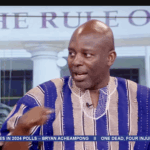
A governance expert with the Centre for Democratic Development (CDD-Ghana), Professor John Osae-Kwapong, says the ongoing confusion over the Anti-LGBTQ+ Bill highlights a deeper policy dilemma for Ghana—whether the country truly knows how it wants to address issues of sexual orientation and rights through legislation.
Speaking on the JoyNews AM Show, Prof. Osae-Kwapong reflected on the events leading up to the passage of the Private Members’ Bill, the President’s delay in assenting to it, and the subsequent Supreme Court challenge filed against the legislation.
He explained that after the bill’s passage, the President paused on giving his assent following the court case, which questioned aspects of the bill that the plaintiffs found constitutionally problematic.
Prof. Osae-Kwapong also pointed out that the issue had long become a politically charged one.
Despite the two main presidential candidates clearly stating their positions, he said, some political actors continued to accuse them of supporting the bill.
“So within that context, I am not surprised that the conversation has turned out the way it did,” he remarked.
He added that beyond the question of whether the bill has expired or needs to be reintroduced, the real issue is whether Ghana, as a country, has decided on a consistent policy stance regarding the matter.
“If Ghana as a country believes this is something that needs a policy response in terms of legislation to outlaw it, then whatever Ghana chooses—whether the bill has expired or not—that question still remains: what does the country want to do?” he asked.
Prof. Osae-Kwapong further noted that if it is the considered opinion of the President that the matter should be treated as government-sponsored legislation, then the appropriate process must be followed through Parliament.
“You would have to wait for that government-sponsored legislation to come to Parliament and see it through,” he explained.